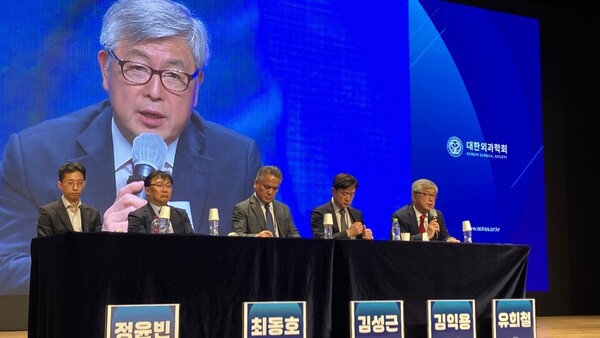The government has proposed the introduction of a national responsibility system for medical residents’ training to enhance the quality of such training,
However, the medical community remains unenthusiastic, concerned that the government could use it to control trainee doctors in exchange for paying for their training.

At the “2024 Great Debate” held by the Korean Surgical Society (KSS) on Saturday on the theme of “Dying surgical department as a center of essential care, needing urgent resuscitation” at Seoul National University Bundang Hospital, surgical professors, while positively regarding the government's proposal to expand financial support for specialists' training, also raised concerns.
"Medical resident training should be closer to education than work or labor. Most developed countries support a large portion of trainee doctor's salary," said Professor Kim Ik-yong at Wonju Severance Christian Hospital, also an insurance director at KSS. "It seems that Korea is the only country that does not. Our society has regarded trainee doctors as laborers rather than trainees or students. Even so, the government seems willing to support the education of essential medical specialties."
How much does it cost to train a resident surgeon?
The KSS estimated that 35.7 billion won ($26.2 million) would be needed yearly to train surgical residents if the national responsibility system for training specialists is introduced. In April, the government requested opinions from professional societies to develop a concrete proposal for the five financial projects of the healthcare reform, including the national responsibility system for training interns and residents.
The society divided the 35.7 billion won into 9.6 billion won per year to support the work allowance for trainee doctors, 17 billion won to support the education allowance of 1,700 teaching doctors, 4.8 billion won to support the education allowance of 88 supervising doctors and 20 deputy supervising doctors, and 4.3 billion won to support manpower costs at training hospitals.
In addition to manpower support for trainee doctors, the cost of supporting educational programs to strengthen the training process was also estimated at 860 million won per year, including 420 million won to support the cost of skill training for surgical majors, 340 million to improve the training environment for junior doctors and evaluate the training environment, and expenses for e-learning.
The cost of direct training alone is nearly 40 billion won.
"It may be important to have the government's help and unconditional 100 percent support (for training), but we need to think comprehensively about whether we can make a good program with (financial support) and turn out doctors who are retained and trained in surgery, which is an essential medical specialty, and lead Korea's essential medical specialties," Kim said.
Concerns raised about possible 'depriving doctors of their autonomy'
However, the medical community voiced concerns about the national responsibility system for residents’ training. While doctors agreed with the direction of the government taking responsibility for the training of specialists, they said it is necessary to consider additional financial resources, including compensation for medical accidents related to trainee doctors in essential medical fields, in addition to those directly required for training.
In particular, since massive financial resources will likely be invested in training medical residents, they said it is necessary to organize and support separate financial resources other than health insurance resources.
"Compensation for medical accidents related to medical residents is missing from the financial estimates. Even if complete compensation may be difficult, I think it will cost a little more than the current estimation, which did consider the cost of insurance that can reduce liability for medical accidents," said Dr. Yu Hee-chul, vice president of KSS, who also chairs the society’s Training Environment Evaluation Committee.
Yu said that for a national responsibility system to operate well, the necessary financial resources must be raised from other sources. If the national responsibility system for medical resident training is operated by paying for it from part of the health insurance finances as it is now, it is little different from not taking full responsibility in a poor environment.
"To resolve the cost issue and improve the quality of training, a council should be created to establish a specialized training system for interns and improve the quality of training within each of the 26 specialties," Yu said. "The KSS should also strive harder to strengthen the public nature of such training if it receives state financial support."
There were also concerns that a system where the government pays for the training of junior doctors could have the side effect of tightening its grip on trainee doctors.
"I am worried that the government will provide partial financial support for the training of junior doctors and control them after they complete their training," said Shin Eung-jin, president of the Korean Medical Association. "The national responsibility system sounds good, but I worry it will remove trainee doctors’ autonomy. We need to think about these concerns within the medical community."
Kim also said, "One concern is that if the government pays all the training expenses for trainee doctors, it may tighten a noose on them. If the government provides funds for trainee doctors, we should accept it, but we should know that there are such negative possibilities.”
Related articles
- ‘Government will never delay state medical exam for students boycotting class’
- Severe staffing disruption causes partial surgical shutdowns at university hospitals
- Government-doctor standoff continues despite looming deadline for return of trainee physicians
- Cons overwhelm pros over 20 times on Seoul's plan to introduce foreign doctors
- Trainee doctors see government’s promise to improve training environment as a 'bad check'
- Amid dwindling revenues, university hospitals tighten their belts to stay afloat
- Government will ‘take care of’ only trainee doctors willing to return

